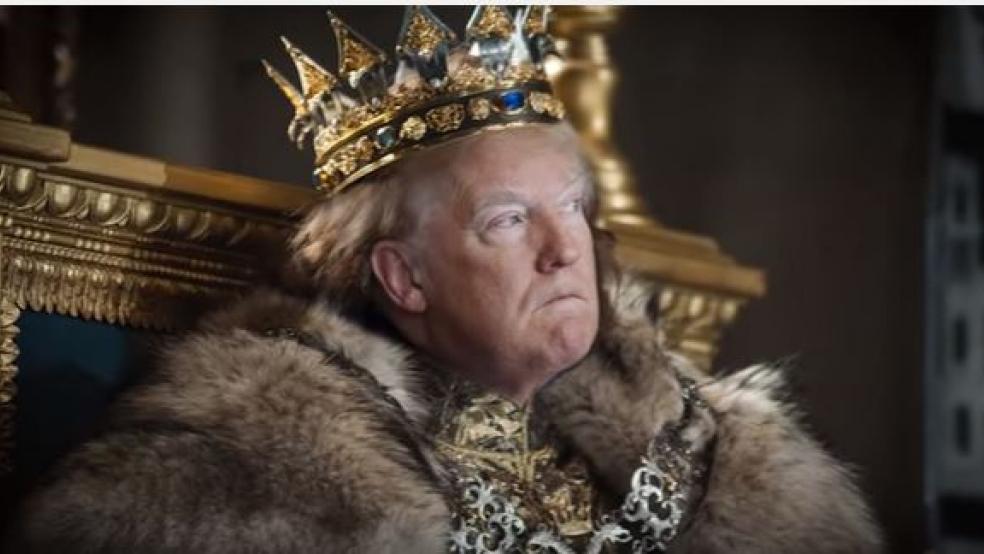From the earliest days of his presidential campaign, there has been an air of authoritarianism around the man who now occupies the Oval Office. But over the past few weeks, as Donald Trump approached and then passed his 100th day in office with campaign promises unfulfilled and no credible claim to major legislative accomplishments, his administration’s nods toward anti-democratic values have been coming faster and faster.
Over the weekend, the White House announced that Trump had a warm phone call with Rodrigo Duterte, the president of the Philippines, in which the two leaders discussed, among other things, Duterte’s war on drugs. Trump has praised Duterte’s efforts to rid his country of drugs in the past, but the program is viewed with horror by international human rights organizations. Its hallmark has been the extrajudicial executions of thousands of people, with Duterte’s blessing, by the police. Duterte himself has admitted to personally murdering drug suspects in the past.
Related: Trump Calls Schumer an Incompetent ‘Fool’ Just When He Needs Him Most
The call ended with Trump inviting his Philippine counterpart to visit the White House.
It was not the first time that Trump has tried to cozy up to foreign leaders who have violated human rights and international laws to consolidate their power. His admiration for Vladimir Putin of Russia, for example, was well-documented during the presidential campaign.
In an interview with the Washington Examiner columnist Salena Zito, published Monday, Trump discussed his meeting with Egyptian President Abdel Fattah el-Sisi, a former Army General who took over the country in a coup d’etat in 2013 and has since been accused of a raft of human rights abuses. At the time, el-Sissi’s government was holding American aid worker Aya Hijazi prisoner on charges that international human rights groups dismissed as ridiculous.
Trump said he told el-Sissi “it would be a great honor” for the United States if the Egyptian authorities released Hijazi. Late in April, the Egyptian government did just that. While it was clearly a positive for her, it was, to say the least, different for a US president to describe the release of an unjustly held prisoner by a foreign power as an “honor.”
Trump also notably called and congratulated Turkish President Recep Tayyip Erdogan last month after a referendum in that country granted him what amount to dictatorial powers allowing him to bypass the country’s legislators entirely.
Related: Trump Gave Democrats a Huge Opportunity, and They’re Blowing It
In an interview over the weekend, Trump gave the impression that he wouldn’t be averse to changing the rules in the US, to make it more difficult for a minority in Congress to impede the changes to US policy that he has been trying to enact.
“It’s a very rough system -- it’s an archaic system,” he told Martha McCallum of Fox News. “You look at the rules of the Senate, even the rules of the House, but the rules of the Senate and some of the things you have to go through, it’s really a bad thing for the country in my opinion. They are archaic rules. Maybe at some point, we’re going to have to take those rules on because for the good of the nation things are going to have to be different.”
He added, “Decisions that nobody wanted are made because of archaic rules. That’s something that I think we’re going to have to change.
Then, at a rally on Saturday marking his 100th day, Trump returned to another topic that has made civil liberties advocates nervous: the idea of curtailing First Amendment rights. He has long railed at the news media for what he insists are false stories about him, and on Saturday he revisited his suggestion that his administration might try to make it easier to sue news organizations.
Related: Can Trump Exit NAFTA? Here’s What the President Can -- and Can’t – Do
Trump typically puts it in the context of toughening up libel laws, even though libel is covered under state, not federal law. That, however, isn’t stopping members of his administration from discussing it.
“I think it's something that we’ve looked at,” White House Chief of Staff Reince Priebus said in an appearance on ABC on Sunday. “How that gets executed or whether that goes anywhere is a different story.”
Priebus also said that the administration wants the media “to be more responsible with how they report the news.”
He also nodded toward the possibility of banning another type of speech that Trump disagrees with: flag burning. Trump suggested Saturday that people who burn the US flag should be imprisoned and possibly have their citizenship revoked.
Related: 3 Ways Trump’s Tax Proposal Could Change the Economy
While many people find it reprehensible to desecrate an American flag, the Supreme Court has ruled -- twice -- that while it may be distasteful, it is a form of constitutionally-protected speech.
But that apparently stops neither Trump nor his advisers from considering it.
“People need to stand up for our flag,” Priebus said. “You know, the one thing that we have in common as Americans is our American flag. And I think it's something that, again, is probably going to get looked at.”
In this case, however, Priebus hinted at the possibility that, at least on the flag burning issue, what we’re seeing is less creeping authoritarianism than it is cynical political opportunism. “It's a 70 percent issue in this country,” Priebus said. “He wins every day and twice on Sunday on our flag.”






